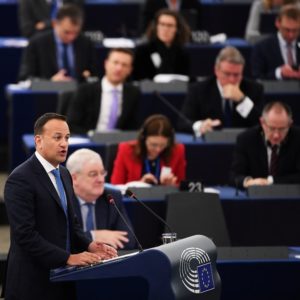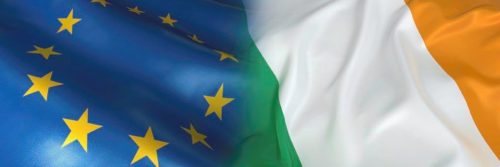There’s nothing simple when I’m not in the EU
Ireland’s commitment to EU membership

This week the Republic of Ireland has been in the minds of many people. Hearing about the sudden loss of The Cranberries singer Dolores O’Riordan made numerous music fans very sad. Her lovely and strong voice with a distinct Irish accent was a favourite to many, having sold more than 40 million albums worldwide. Ireland as such is excellent in nation-branding, which not only extends to music, culture or loud Saint Patrick’s Day celebrations, but also on the international political scene, having fostered their neutrality combined with EU membership and strong ties with its large diaspora.
In the world of EU affairs, Brussels and the EU institutions are alive and kicking after the winter holidays, to the delight of many journalists and news outlets that had trouble producing interesting news during the break. Hence, this week marks the first European Parliament plenary session. The guest of honour was the Irish Taoiseach (Prime Minister) Leo Varadkar, who shared some interesting thoughts and his vision of Europe. As the European Parliament has decided to invite the European leaders to address the topic of the future of Europe, Leo Varadkar had the honour to be the opener. Needless to say, it was not coincidentally.
Mr. Varadkar gave a convincing and encouraging speech that reiterated Ireland’s dedication to the European Union, with clear messages on the future of Europe. He defended the free market and the Euro, promised to do more on the gaps of his domestic tax policy and praised the EU for understanding the specific position of Ireland in the Brexit talks. After his speech, European Commission President Jean-Claude Juncker expressed enormous satisfaction with his “close friend’s” speech and joked in his specific way that he did not have anything to add. The notorious Brexiteer Nigel Farage only managed to provide us with yet another false statement, this time claiming that Leo Varadkar used to work for the EU institutions.
So how to explain this convincing and bonding love between the Republic of Ireland and the European Union? First of all, we need to look back into the history books. Coming from a more than turbulent past, the Republic of Ireland became an EU member (back then it was called the EEC) in 1973. In the meantime, Ireland went through a period of ups and downs. Evolving from a poor country burdened with the Northern Ireland conflict (The Troubles), in the 1990s Ireland got the nickname “Celtic Tiger”. It was because the country, triggered by EU membership, progressed through strong economic growth. Unfortunately, a decade ago the country suffered heavily during the economic crisis, but managed to recover.

Recently, Ireland even became for the first time a small net contributor into the EU budget. Also, the country became an attractive destination for many migrants moving from other European countries, and Polish is nowadays considered the second spoken language. Ireland’s liberal approach and pro-business tax policies brought large companies such as Google and Apple to open their branches in Ireland, which resulted in the creation of many jobs. Even some of my compatriots ended up working there. However, at the end of the day, the tax issue remains controversial, especially the well-known clash with the European Commissioner for Competition Margarete Vestager, who took Ireland to the European Court of Justice for Apple’s 13 billion Euros of state aid.
However, it was Brexit per se that brought complete focus on Ireland, and the Irish influence proved to be much bigger than the usual influence of small countries in the EU. With lobbying and a diplomacy that knows what it wants, Ireland managed to prioritize the border issue with the Northern Ireland in the Brexit talks. Having in mind the sensitivity of the topic, Ireland strongly argued that, in accordance with the Good Friday Agreement, any hard border with Northern Ireland would result in damaging and potentially dangerous consequences. It was put on the agenda of the Brexit talks, with the results being basically that Northern Ireland citizens will stay in the EU, and that there will be no hard border, to the satisfaction of the whole island.
Finally, despite the history of rejecting-then-accepting the Treaties of Nice and Lisbon, the stance of Irish citizens is decisively pro-European. Citizens of Ireland are consistently on top of the EU member states surveys such as Eurobarometer when it comes to their enthusiasm towards the EU project, with impressive numbers. However, it remains to be seen what will be the Brexit outcome, as the Irish economy is strongly tied to the UK, and is already losing money due to this process. Although, with hardcore Brexiteers suggesting another referendum these days, maybe it is time for the UK to experience the feeling of a second referendum. To be honest, it would not be surprising.
